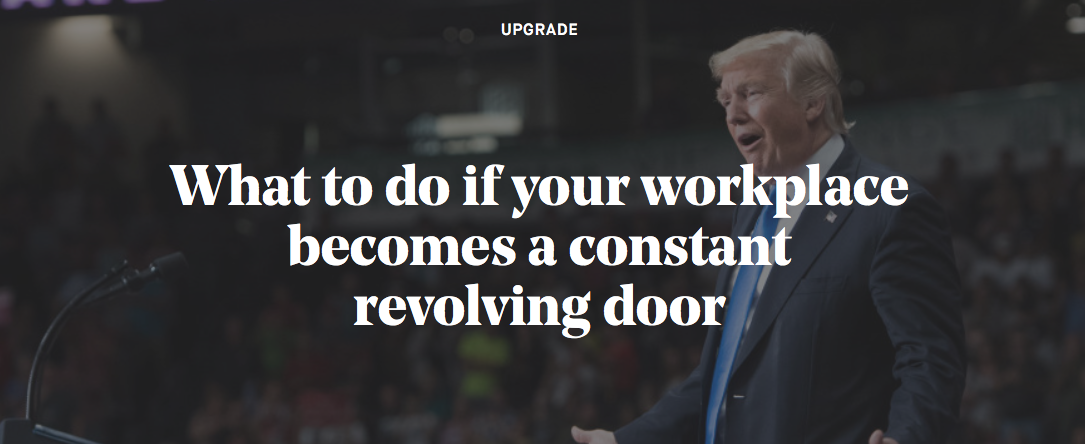Press Clips
High turnover can be an opportunity to move up or move on.
High turnover at work means it’s time to step up – or step out.
The White House has seen seven senior officials leave in roughly six months. In just the past week: White House communications director Anthony Scaramucci was canned Monday after 10 days on the job; chief of staff Reince Priebus was ousted days earlier and replaced by John Kelly; and press secretary Sean Spicer had tendered his resignation.
But this kind of executive musical chairs, while unprecedented in the West Wing, happens in companies in transition all of the time. Over the past couple of months, Uber’s CEO Travis Kalanick and 13 high-profile executives left in the wake of persistent harassment and sexism scandals at the company. Blue Apron’s COO Matthew Wadiak also stepped down in the wake of the meal delivery service’s IPO plummeting. And Snap’s top lawyer, head of HR and VP of security have all left Snapchat’s parent company as its stock sinks.
Wendi Weiner, an attorney and career expert, told Moneyish this kind of senior level shakeup is especially common in startups and modern, digitally-driven business.
“The tech and startup world sees a lot of movement,” explained Weiner. “I’ve worked with a lot of C-Suite executives in the startup world, and they shift their careers around very early on, whereas executives at established companies like American Express or IBM tend to stay rooted.”
But it’s still stressful – especially for the employees who just want to keep their jobs.
See also: Donald Trump just ousted Anthony Scaramucci. What to do if you think you’re about to get fire
“Turnover in leadership can be scary and for good reason – with new leadership can come changes in personnel, culture and strategy,” workplace expert Heather Monahan told Moneyish.
So the first thing you should do is hope for the best – but prepare for the worst. “Ensure that you have an updated resume and are actively building your network,” said Monahan. “Backing up all contacts into a private file, and saving any work examples you may need if the new leader decides to eliminate you or your position, is wise.”
Introduce yourself to the new boss or power players, and demonstrate how you can help in this time of transition. “If you can position yourself as someone that can solve problems and be a bridge solution for new leadership, you can secure yourself a spot until you decide if you want to be there,” said Monahan.
Next you need to decide whether this is an organization that you want to stick with, or if there’s still a future in it. “Uber has had a lot of workplace culture issues lately, but look how fast that business is accelerating. There is still growth opportunity there” said Monahan. “But if you’re not in a great industry, it’s not growing, and you seriously doubt the company’s ability to survive, staying may not be worth your time in the long run.”
See also: Sean Spicer just quit. Should you be next?
But don’t take advantage of the chaotic work environment to start showing up late, cutting out early or blowing deadlines. People will notice. And people will remember who stepped up when the chips were down – and who skipped out.
“Even if your manager is absent (or nonexistent at the moment), you don’t want to slack off and make yourself a target,” said Weiner.
Monahan agreed. “Be professional. Do your job to the best of your ability,” she said. “That’s the kind of reputation you want to leave behind if you potentially aren’t there in the future.
Because if you’re going to hang in there, this could be a great opportunity to make some moves to advance within the company. Rolling with the changes in your workplace demonstrates you’re good under pressure, adaptable and able to grab unexpected challenges by the horns.
“Don’t just focus on the list of responsibilities in your job description – now’s the time to grow your skill set by offering to fill in where someone is missing,” said Weiner, who also suggested keeping a “brag book” updated with new projects, key contributions and results that you are effectuating at the company.
“It’s really important that you’re open to change, because what employers are looking for people who are ‘versatile’ and ‘flexible,’” Weiner added. “Those are the best buzzwords to have on your resume today.”


